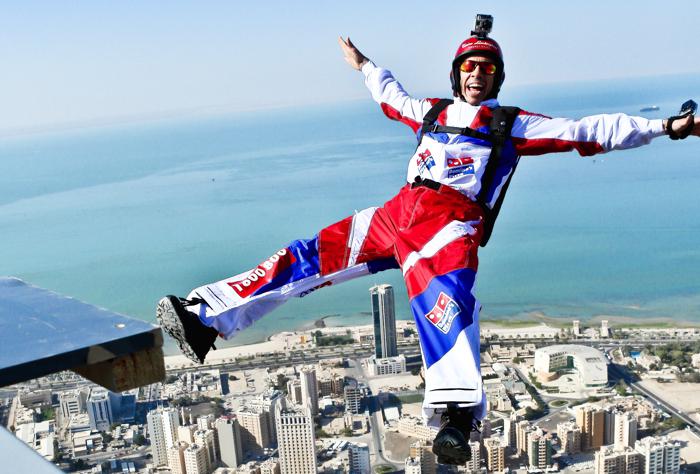After taking an elevator up 78 floors your ears are likely to pop. Then, given the hike up another 9 floors of stairwell, you will probably notice yourself more out of breath than expected. Next, a door opens and you step outside to find all of Kuwait laid-out like an urban blanket, almost half a kilometer below your feet-oh yeah, and there is no walkway! I started writing this in my head approximately 414 meters above Kuwait, outdoors, with a fair wind blowing. The primary reason for this is that, given the surroundings, you would think it would be the potential of dropping to ones death that would stand out most in ones mind, but it’s not. In this case, it’s the vivacious and charismatic spirit of Chris McDougall, or “Douggs” as he is often known, as he is plotting his jump from said spot in a few days time.
He is checking wind. He is meticulously calculating landing spots. He is assuming trajectories with the confidence of a physics professor. And, he is currently requesting to know the feasibility of building a ramp that he might get a running start: you’ve got to respect that! After a later conversation it becomes clear though that this is how he lives his life: with a respectful fear of death, and a simultaneous willingness to dive forth in the ever-present face of it. Beyond that, with more than 2600 jumps beneath his belt, and as a virtual grandfather of the sport at this point, he has honed his skills to the degree that, given the right wind conditions, he can literally land on a dime. Sitting down at a café later that afternoon, we got to speak with him and dissect the ins and outs of his career:
How did you get into B.A.S.E. jumping?
That’s a long story…but basically back in 1996 I was skating, surfing, and snowboarding as well. I was just a young punk with his mates looking for ways to blow off steam as a kid. One day we got into our heads to try to skydive; at that time, I really only expected to do one jump. If I survived it, I figured that would be enough. I would just be happy and continue living my life. But that first jump changed everything about my life for the better. From that moment on we started hooking up with other like-minded people. Though at the time they may have seemed like the wrong kind of crowd, they would form a group that would all end up becoming champions. My best mate, Wildman, and me started competing very early on. Around this same time, we started hearing whispers of this thing called B.A.S.E. Jumping, but it was all quite hush-hush and illegal-primarily because nobody had yet established and legitimized it as a sport. My first experience was in Melbourne, I was going to a jump that some guys were doing, where I would be the ground crew. When I arrived they handed me a chute and said you’re going too! It was a simple bridge into the water but it turned into quite a spectacle. We got in trouble with the police and the media showed up too—but I was hooked. At this point though, Wildman and I went back for more skydives until we had reached the now prerequisite number of 200 skydives as preparation for B.A.S.E. jumping. We trained the whole way through so that we were ready when we hit that number. We, and the guys before us, were really pioneering at that time and making it up as we went along.
How has the sport progressed for you since?
It was just a bit of fun before, now it takes me around the world. We get to go to the most amazing places in the planet. Additionally, it gave me a purpose, gave me true happiness, and a way to vent my energy. Kids turn to all sorts of other things because they don’t have another way to get that teenage angst and energy out of them. Sports like these give them a way to vent it in a positive and controlled environment. For me, I’m just really grateful to have found it, so if I can spread that positivity to kids out there. I am happy to do it- that’s a great thing.
How important are the topics of positivity, accomplishing goals, and living your dreams to you?
When you start base jumping you really have to come to terms with your death. We are all going to die; it’s just a matter of when and how. Our time on this planet is finite. It seems like most people in the world live as if they do not really understand that. They are always planning for a future that never comes. We, as extreme sports enthusiasts, have to come to terms with these things very early on. You have to know that what you are doing could easily kill you. Once you accept the inevitability of your own death, the whole world opens up and you can truly live. It’s an amazing feeling. From then on, anything is possible. Instead of I can’t, it becomes how can I do this? For me, it started, obviously, with B.A.S.E. jumping. But the mentality has transferred to all aspects of my life. My dad used to say to us ‘you don’t have to be the best, you just have to be the best you can be.’ It’s a whole outlook too, that even if life serves you a negative, there is a positive that can be learned from it.
How do your parents/society view your job?
I’m a carpenter by trade, but I’ve also worked in the oil business a bit. Still, the best thing I ever did was quit my day job. However, the second best thing I ever did, was recognize when it was time to get another. Breaking free of the constraints of society is tough, but once you break free you realize…it’s all good!
Is it hard watching the sport grow up around you given changes, etc?
It’s a double-edged sword. My personal evolution is, quite frankly, better than I could have ever imagined. I have exceeded everything I thought possible for myself. The evolution of the sport has been additionally amazing, but with the access of knowledge via videos, books, etc., comes a lack of respect. Not just a lack of respect for yourself, or your fellow jumpers, but also for the sport itself. There have been over 200 deaths in the sport of B.A.S.E. jumping over the 30 + years it has been around, but 55 of those have happened in the last 3 years. And, of all those, all but 1 has been due to human error. People are reinventing the wheel that we invented, but they’re not necessarily taking the time to get it right. There are a lot of people who just try to learn by watching videos off the Internet. But that’s not training, it’s entertaining! When we learned things like flips it took 5 years or so, now guys are trying it within a couple weeks. The only problem here is when they haven’t properly progressed in a manner that’s safe. B.A.S.E. jumping is easy when it goes well. It’s not until something goes wrong mid-air that your training really pays off.
How is the sport viewed worldwide?
Back in Australia, there are currently about 90 different laws I would be breaking. In a span of ten days last year I went from being an athlete in Switzerland to being a rock star in China, to a criminal in Australia.
Describe the moments before a jump:
I have a strict routine. First I check the wind again. Then I mentally prepare. I try to get myself at a 70% stress level—too calm and you’re asleep, too anxious and you’re foolish. Then 3 deep breathes, and on the last, I go. That first step of commitment…nothing beats that.
Describe the fall:
Because all the elements of the fall itself are calculated on the fly (pun intended), it requires a lot of quick decision making, calculating and recalculating on the way down. As for how I know when to pull the shoot, the phrase us Aussies use is “get scared—then wait a second!”
Any near death experiences?
Only once, I was in a wing suit and the strap for the shoot wouldn’t open. I had a bad grab. As I started to pull at the pocket that wasn’t opening I basically closed down [or essentially pulled in the wings-his arms- to mess with it, effectively cutting off his forward flight and turning all his forward speed into downward speed]. In doing so I almost immediately changed my 20 seconds of remaining flight time, down to about 5 seconds This just serves to illustrate how dangerous this can be without the right training. When you are about to die there are two things you can do, you can either panic, or you can take a deep breath and deal with it.
For a guy as calculated as he is, McDougall states that this near death experience shook him. Just a short three months later, this same problem would turn fatal for a friend of his.
The folks over at Camco Global Events have worked tirelessly with Chris from start to finish to make sure this event happened. They were instrumental in bringing him here, getting all associated permits etc., and keeping the plan on track. For that, Chris says he is grateful. For their part, they say that have many more big events planned for the future—so stay tuned!
By the time you are reading this, Chris will have already moved on. He will have successfully B.A.S.E. jumped from the peak of Al Hamra Tower not once, but twice, in an effort to bring this sport to a new nation (despite the fact that it is still illegal in his own). That is where his head is at these days, travelling the world as an ambassador for the sport he loves, preaching positivity with a relentless belief in following your dreams; one giant (and sometimes scary) step at a time.
Follow Chris “Douggs” McDougall on Instagram @douggsbase or via his fanpage on Facebook. Images courtesy of bazaar magazine and Camco Global events.




















